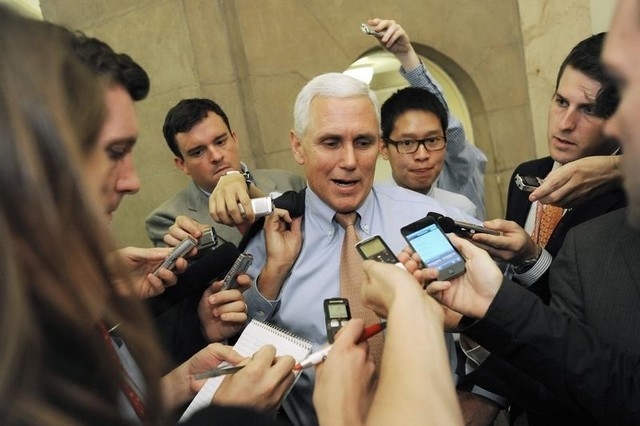Controversial ‘religious freedom’ law last thing Indiana casinos needed

A heated debate over religious freedom and gay rights was not what Indiana’s challenged gaming industry needed.
The state’s 13 casinos experienced a 10 percent decline in gaming revenue in 2014 due in large part to new competition in neighboring Ohio and Illinois siphoning away gambling customers.
Possible boycotts of the Hoosier state by convention organizers and other tourism groups and mountains of bad publicity over a controversial “religious freedom” law weren’t helping matters.
Disaster might have been averted Tuesday. Indiana Gov. Mike Pence asked lawmakers to fix the measure to avoid any discrimination against gays and lesbians.
Indiana’s gaming industry breathed a sigh of relief.
Pence signed the bill last week, which lets Indiana business owners cite “religious freedom” as a legal defense. Detractors said the bill allowed the businesses to deny services to lesbian, gay, bisexual and transgender customers.
Business leaders, including Apple CEO Tim Cook, said they were disappointed in the law. The CEO of Angie’s List said the company would halt plans for a major expansion in Indianapolis because of the bill.
The Indianapolis Star ran a front page editorial Tuesday, telling Pence to “Fix this now.”
Indiana’s casino industry also wasn’t a fan of the measure.
The threatened tourism boycotts could have inflicted collateral damage to properties operated by Las Vegas-based Caesars Entertainment Corp., Boyd Gaming Corp., Pinnacle Entertainment and Full House Resorts.
“We actively oppose any forms of discriminatory legislation,” Caesars Senior Vice President Jan Jones Blackhurst said.
The company, which owns the Horseshoe Southern Indiana in Elizabeth and Horseshoe Casino Hammond, has been one of the gaming industry’s pioneers in marketing to customers from the LGBT community.
The Republican governor originally said the law wasn’t about discrimination. With Indianapolis the center of attention this weekend as host of the NCAA men’s basketball tournament Final Four, he changed his view.
Casino company representatives said their properties are made up of customers and employees from all walks of life.
“Boyd Gaming believes strongly in diversity and inclusion, and we strive to ensure that every person feels welcome when they visit us,” company spokesman David Strow said of the Blue Chip Casino in Michigan City.
Pinnacle Entertainment Executive Vice President Troy Stremming said the Ameristar East Chicago and Belterra in Florence “are dedicated to an environment than embraces all cultures, life experiences and backgrounds.”
Macquarie Securities gaming analyst Chad Beynon said Indiana casinos already face enough challenges. A tourism boycott wouldn’t help reverse five straight years of negative trends.
Indiana casinos draw customers primarily from surrounding communities. That’s one reason Ohio’s 11 casinos and racetrack casinos, which have opened in the past two years, sliced into Indiana’s totals.
Ohio grew gaming revenue 36 percent to $1.45 billion last year. Indiana fell to $2.12 billion from $2.35 billion in 2013.
Most casino leaders want the Indiana legislature to approve a bill that allows riverboat casinos to move their gaming space off floating barges and onto land. Operators prefer gaming to take place on one floor, rather than multilevel gaming boats.
After the rapid expansion in Ohio, casino operators are seeking new ways to attract business, such as easier access for customers in nearby states.
Northern Indiana casino operators are concerned about the Pokagon Band of Potawatomi Indians dropping a Four Winds Casino into South Bend that would be larger than the Horseshoe or Blue Chip. The idea still needs a litany of approvals.
Pence is opposed to expanding the gaming footprint in Indiana.
Beynon said Indiana has always been viewed as a pro-gaming state. Neighboring Kentucky has failed several times in the past 10 years to legalize casinos, which has helped keep the Indiana market afloat.
Beynon said Indiana’s governor “is in a difficult situation” because the lower casino revenue means less tax revenue and potentially fewer casino jobs.
“If Kentucky legalizes casinos, it’s going to get worse,” he said.
Gaming leaders are happy a clarification will be made to the “religious freedom” law, which takes effect July 1. They were ready to revise marketing plans if any of the rumored tourism boycotts gained traction.
With the protests fizzling, the casinos can get back to the business of inclusion.
“We hope people support businesses that support them,” Stremming said.
Full House Resorts CEO Dan Lee said the company’s Rising Star casino in Rising Sun — like all of Indiana’s gaming industry — wasn’t built to turn away business.
“If you want to have a gay marriage ceremony at the Rising Star, we’re here for you,” Lee said.
Howard Stutz’s Inside Gaming column appears Wednesdays and Sundays. He can be reached at hstutz@reviewjournal.com or 702-477-3871. Find him on Twitter: @howardstutz.












